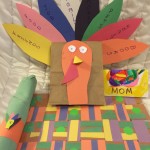 Holidays are a time of family traditions, reflection and thankfulness! Remember to include children in the planning and preparation. In 4-H, we stress learn by doing and want to encourage you to consider that motto. Children love being included – it inspires their creativity, imagination and sense of belonging. Being involved teaches life skills, such as measuring, meal preparation, teamwork, design and relationship building.
Holidays are a time of family traditions, reflection and thankfulness! Remember to include children in the planning and preparation. In 4-H, we stress learn by doing and want to encourage you to consider that motto. Children love being included – it inspires their creativity, imagination and sense of belonging. Being involved teaches life skills, such as measuring, meal preparation, teamwork, design and relationship building.
Some ways to involve children are very simple! Have them help shop or find bargains with a Holiday Scavenger Hunt. Give each child a list of grocery products to find. They will have fun locating items at the store or finding the best buys in advertisements. Older kids can clip coupons.
Make simple inexpensive decorations for you festivities provides another way for youth to feel they are contributing. If you need ideas you can make handprint decorations, centerpieces, placemats, name cards, napkin rings. Napkin rings can be made out of cut paper towel rolls or construction paper glued in a circle and decorated with artwork, fabric, leaves or even feathers. This is a great time for kids’ creative talents to be developed and enhanced. Guests will admire these items while enjoying the meal.
To help the day go smoothly, consider your needs and home size. For example, if you have a small kitchen let them help you prepare items ahead of time for the meal. Consider having older youth select a recipe to be the lead chef, the do a trial run prior to the holiday meal. Kids can easily help: wash fruits and vegetables, snap green beans, crack eggs, stir cake batter, roll out pie crusts, mash potatoes, or put relish items on a tray.
Let kids set the table. Make the task simple by using a printable table-setting cheat sheet showing where items should be placed. Have kids count out the number of place-mats, name cards and napkin rings needed.
Other traditions to consider include:
- Make a family trivia game. Have children ask each person to write down trivia questions about events that happened during the year, or family history. Collect the questions and give out small prizes for each correct answer.
- Play the A to Z family gratitude game. Have everyone sit together and each person says what they’re grateful for, according the letter of the alphabet the player is up to.
- Read a book about the holiday to help children learn the meaning or history of the holiday.
- Help someone less fortunate, lonely or in poor health by serving meals, raking leaves, taking them a plate of food, or a card.
- For example, during Thanksgiving you might create a turkey of thanks. Have children cup paper feathers and place them at each place setting. When everyone sits down to eat, have them write one thing they are thankful for. Create a paper turkey centerpiece by passing a paper bag and glue stick letting each person glue on their feather telling why they are thankful.
Sounds simple, and in all reality it is. Adults give guidance to children helping them identify and feel good about the positive things in their lives. The trick is to relax, plan and enjoy the holiday together. One web page that gives lots ideas for holiday decorations the family can do together http://aboutfamilycrafts.com/ All Extension programs are open to all persons regardless of race, color, age, sex, handicap or national origin.
 0
0
